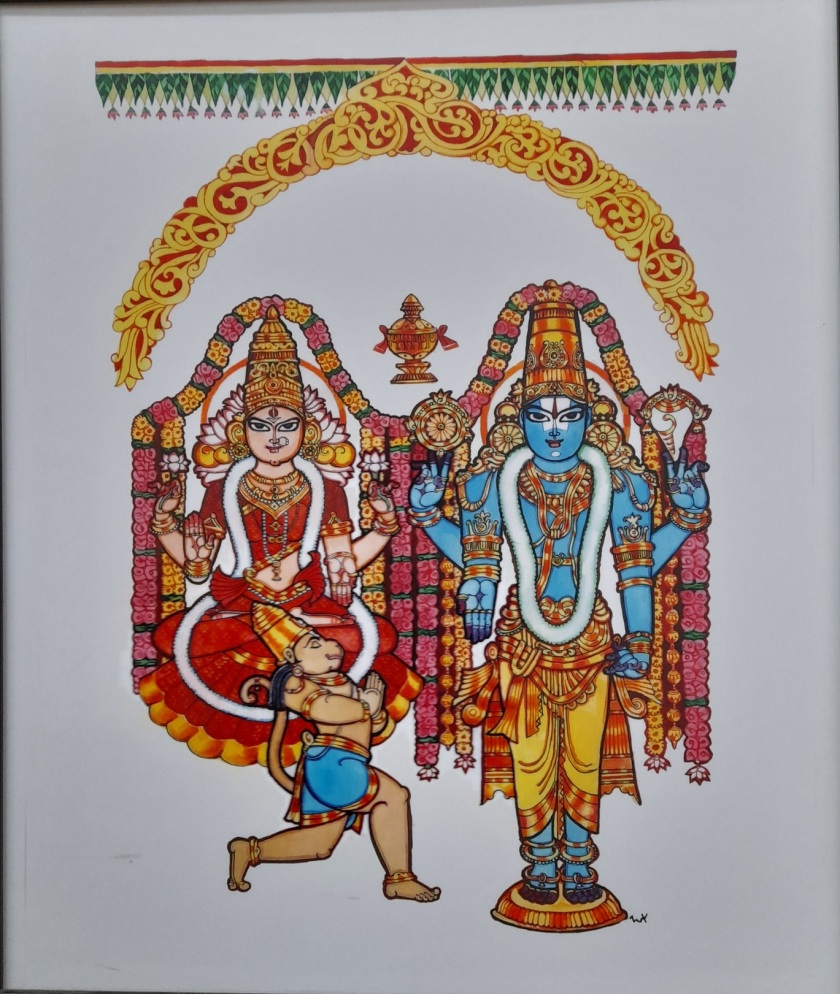Last week, while working on the translation of Piṉpaḻakiya Perumāḷ Jīyar’s Āṟāyirappaṭi Guruparamparāprabhāvam (1), we read about Periyāḻvār’s victory at the Pāṇḍya king’s court, as he established Nārāyaṇa as the paramtattvam. This victory is followed by a procession in which the Āḻvār is placed upon an elephant and taken around the city, with music being played, and even the king being part of the procession. And, wishing to see him thus celebrated, like a parent would want to witness their child being feted, Nārāyaṇa comes with His whole retinue and fills the sky. And, as some vyākhyātas would say, instead of immediately asking Him for the end of saṃsāra and mokṣa, Periyāḻvār, who is wonderstruck at the sight, worries for the safety of the Almighty. Being noticed by so many different people whose intentions and minds is surely cause for some worry! What if He gets dṛṣṭidoṣa? So the Āḻvār picks up the bells adorning the elephant and using them as cymbals, he starts singing pallāṇṭu (‘many years’), a heart-felt blessing from a devotee to the Lord – a maṅgalāśāsanam.
But what caused such a fear in Periyāḻvār’s mind to begin with? Jīyar describes:

So why was he so worried? Because Nārāyāṇa lived in the wonderful Vaikuṇṭha, which is full of light, forever changeless, untouched by the changes caused by Time, a place where He lived being watched upon constantly by the Nityasūris. That he should turn up to this material world, which is the exact opposite of what Vaikuṇṭha is! But what is so wrong about this world, one might ask (although that’s a question that might perhaps have been a tad less risible before the advent of a pandemic, followed by/accompanied with(?) a war, and God knows what else)? Jīyar continues:
“…this land, which is ‘the great world that gives darkness’ (Tiruvāymoḻi), in which Kali rules [like] an emperor, being subject to change caused by time, having as its svabhāva perishing in an instant (kṣaṇakṣaraṇa)” And then he goes a step ahead, and calls this world “comparable to hell compared with the Supreme Abode, which is the seat of the Supreme Being,” and also “the place of habitation for Rākṣasas and Asuras (my, my! Some really do seem to wander about in human forms!), and which is the place where people of evil intellect have bad intentions!” Well, no redeeming feature for our precious earth there. And as I re-read this passage after the events of the last few days, I can’t say that I disagree.
I guess there are spots on this earth which, according to the GPP and other such texts, have maintained their sacredness, which includes the capacity to purify the others. The divyadeśas, for example. Periyavāccāṉ Piḷḷai claims that it is the purity and sacredness of Tirumalā that gave Tiruveṅkaṭamuṭaiyāṉ His sacredness. And of course, in the commentary on the Tirumālai, Piḷḷai presents Śrīraṅgam as something quite matchless: since Toṇṭaraṭippoṭi Āḻvār does not yearn for Vaikuṇtha (nityavibhūti) nor likes this world (līlāvibhūti), what to do with him? Well, let him live in the third vibhūti, i.e. Śrīraṅgam! Quite an island that floats in the saṃsāra and offers solace till the crossing occurs… And of course, there’s the place where the Vaiṣṇavas and the Ācāryas live. And so forth. Bio bubbles where a mokṣa-seeker is free to breathe.
I hope that not all description of this world is all that depressive in these texts. It reminds one of the gandharva who was hell-bent upon seeing the negative in this world in Venkatadhvari. Does kāvya have more lenient views? Do you know of any passages that praise this world in this yuga?
PS: I have written about this hagiographic text (Guruparamparāprabhāvam) in other posts. Should you be interested, here’s a brief intro on it; a post on the GPP’s mention of the “Others”; a post on the floating verses found in the GPP. And so forth. You can just search for “Guruparamparāprabhāvam“. I think it’s one of the most satisfying texts ever!

